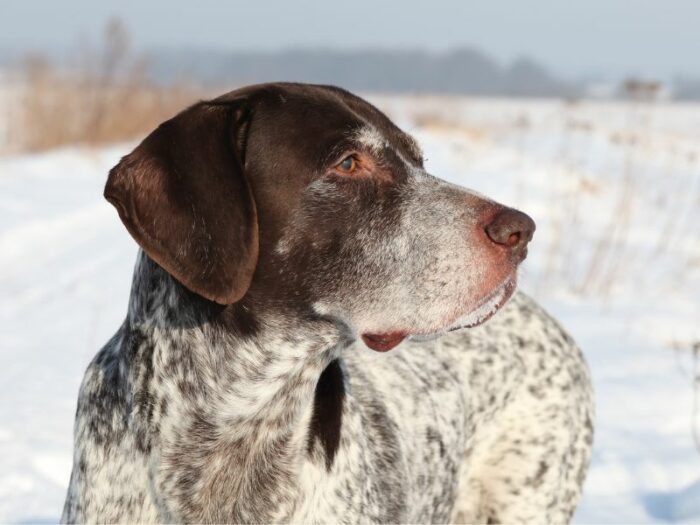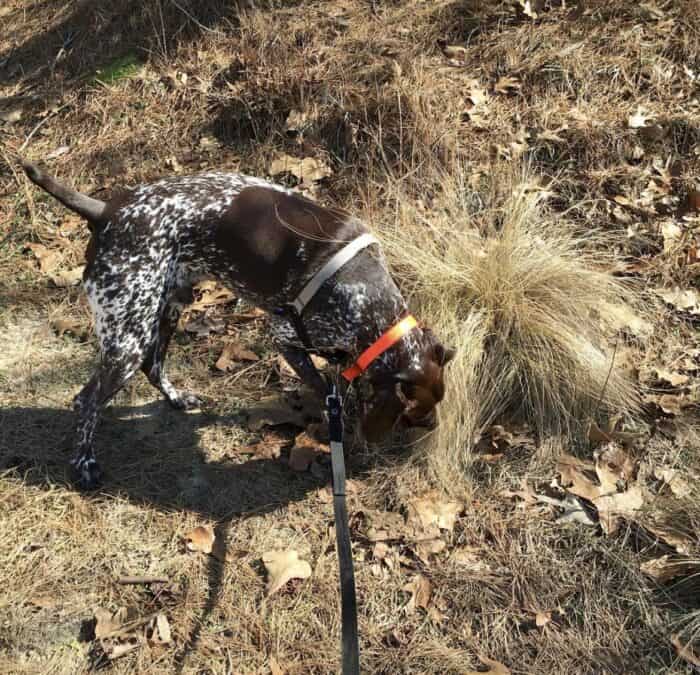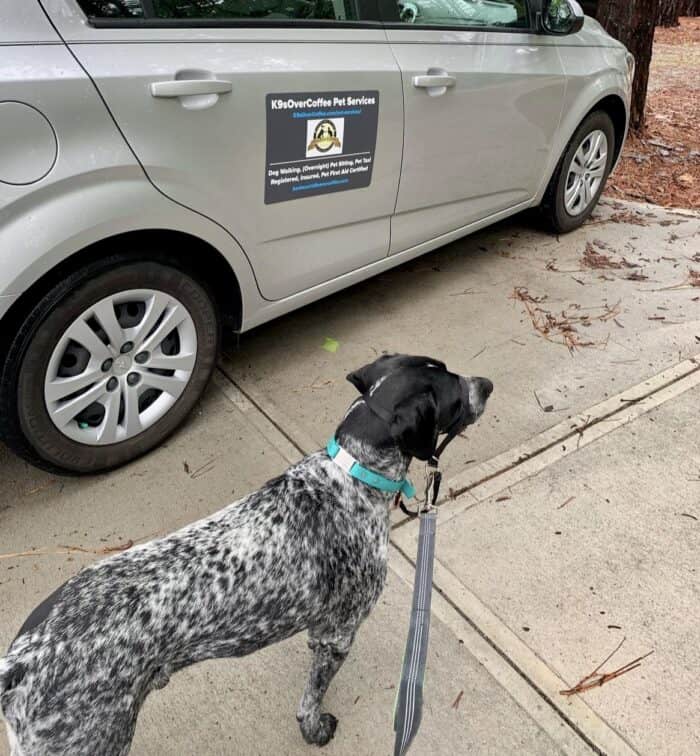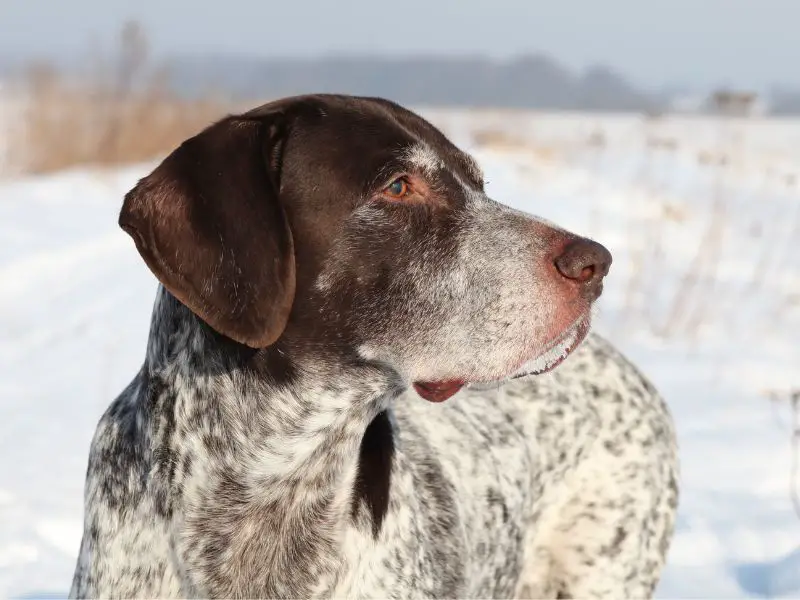This post may contain affiliate links. We may earn money or products from the companies mentioned in this post.
So you want a German Shorthaired Pointer?
Words that come to mind for this particular breed are versatile, high performance, power, intelligence, endurance, speed, agility, athletic, family dog, outdoors and high energy.
That said, GSPs are beautiful all rounder companion dogs who weigh somewhere between 45-70 lbs and have a life expectancy of 10-14 years.

Today, we’ll cover everything you need to know about them, including the good, the bad & the ugly.
After reading our blog post, you’ll know whether or not you have what it takes to care for and keep up with this powerful athlete.
Ready? Let’s dive right in!
1. They Excel at Dock Diving
Speaking of diving, GSPs make really great dock divers although they were originally bred for hunting large game as well as waterfowl in 19th century Germany – just like Weimaraners!
They make such great swimmers because of their webbed toes.
In dock diving, dogs compete for distance and height by jumping from a 40’ long dock/platform into a body of water, usually a pool.
There are certain variations for this sport such as Big Air, Speed Retrieve and Extreme Vertical.
In Big Air, the dog’s jumping distance is measured, and the dog with the farthest jump wins.
In Speed Retrieve, the dog has to retrieve a suspended bumper toy at the end of a pool. The dog with the quickest retrieve wins.
In Extreme Vertical, the dog has to retrieve a bumper toy that’s held 8 feet high above a pool. The dog with the highest jump wins.
Here’s a list of Dock Dog Clubs in the US if you’re interested in checking them out.
Of course you can also test the waters, pun intended, at a doggie swimming pool or a lake you have access to.
Bring an Amphibious Bumper Dog Toy and see if your GSP has fun with it!
2. They Can Run All Day
While they thrive in water, they’re equally powerful on land as they can run all day.
As a matter of fact, these great doggie athletes love stretching their legs in fields, wood trails and on dirt roads.
Thankfully, there are lots of land activities you can engage in with your German Shorthaired Pointer.
For example:
Other dog sports your GSP will likely excel at are agility, flyball and disc dog.
While you can compete in all of these, you can also just do them for fun and to burn your GSP’s endless amount of energy!
3. Their Short Smooth Coat Is Easy to Groom
Thankfully, the GSP coat is easy to care for regardless of dry or wet hunting/playing grounds.
If they get really dirty, a quick bath will do the trick. Otherwise, a rub down with a dog grooming glove will suffice.
You can either give your German Shorthaired Pointer a bath in your yard, your tub or take them to a doggie self wash.
Just do a Google search for the closest one near you.
4. German Shorthaired Pointer Coat Colors
Most GSPs are a mix of white and reddish brown (known as liver) or white and black, but never of white, liver & black!

That said, all of the following coat variations exist:
- Liver & White
- Liver & White Patched
- Liver & White Ticked
- Liver & White Patched & Ticked
- Liver Roan
- Solid Liver
- Black & White
- Black & White Patched
- Black & White Ticked
- Black & White Patched & Ticked
- Black Roan
- Solid Black
FUN FACT: When GSPs are born, they’re mostly white with colored patches, but their ticks (the little spots) won’t come in until 4-6 months of age.
The only exceptions are solid black and solid liver colored pups who are born with their respective coloring.
5. GSPs Have A Strong Prey Drive
Because of their strong prey drive, they’re not good with cats, bunnies and chicken pets unless they grow up with them from puppyhood on.
My German Shorthaired Pointer dog walking client Tab moved to a large property in the countryside that had chickens.
Well, suffice it to say that the chicken population was reduced very quickly as Tab followed his instincts and broke right through his invisible fence and onto the chicken grounds.
Repeatedly.
6. They’re Intuitive & Smart But Also Stubborn
Tab knew exactly that the chicken reward on the other side of the invisible fence was much greater than the temporary discomfort of breaking through the invisible fence.
This is a prime example of how intuitive and smart these dogs are, especially when they’re left unsupervised.
That’s why it’s really important to establish rules and boundaries for your German Shorthaired Pointer early on.
7. Their Off-Leash Time Should Be In A Fenced-In Area
Unless you want to go chasing after your German Shorthaired Pointer, you should have their off-leash time in a fenced-in area.

This could be your own backyard or a dog park. Just make sure to supervise and that the fence is tall enough as GSPs have no trouble clearing high obstacles!
Remember, they can get the bumper toy that’s held at 8’ height in Extreme Vertical Dock Diving.
There are also some membership dog parks that stretch across many acres of land and really allow your pup to run, run, run.
While it’s an investment, this may be a good way to properly exercise your GSP, especially if you’re not the proud owner of a park-like yard.
8. The German Shorthaired Pointer Is A Playful Watchdog Who’s Good With Children
As long as they get the daily exercise they need, GSPs make great family dogs and are good with children.
While they can be rambunctious with their adult handlers and are standoff-ish with strangers, they are gentle with kids.
When Tab’s family had their first baby, he instinctively knew when to slow it down.
9. Common Health Issues of the German Shorthaired Pointer
Like all other deep-chested dog breeds, German Shorthaired Pointers are prone to bloating.
Also known as GDV (Gastric Dilatation Volvulus), it’s when the stomach twists on itself and cuts off the air-and blood supply to vital organs.
This is known to happen when the dog is exercised right after they ate a big meal of (dry) dog food or had large amounts of water.
Elevated dog feeders can also contribute to bloat, so it’s best to place your GSP’s dog food and water bowls on the ground.
To play it safe, only feed your German Shorthaired Pointer after they’ve been exercised and wait to exercise them again for at least one hour after mealtime.
That said, it’s vital to take your bloating GSP to a vet right away. Symptoms are unproductive retching, pacing and very tight skin across the belly.
Additionally, German Shorthaired Pointers are prone to being diagnosed with Hip Dysplasia, Progressive Retinal Atrophy, Hemangiosarcoma and Aortic Stenosis.
With Hip Dysplasia, the joints don’t develop properly and cause arthritis.
Progressive Retinal Atrophy is an eye disease that causes blindness.
Hemangiosarcoma is a tumor that forms in certain organs and causes internal bleeding.
Aortic Stenosis is a congenital heart disease that causes a narrow aorta and makes the heart pump harder than it should have to.
With that in mind, you can drastically decrease the chances of your GSP falling ill by buying your GSP puppy from a responsible breeder who performs health screenings in the dogs they breed.
You can find German Shorthaired Pointer puppies from responsible breeders on the AKC (American Kennel Club) Marketplace.
Avoid buying from puppy mills who are known to produce genetically unhealthy GSPs.
10. GSPs Can Be Strong Leash Pullers
Granted, any dog without proper leash training can pull on leash, but German Shorthaired Pointers are really up there.
Over the years of having GSP dog walking clients, I found that Haltis and Easy Walk Harnesses work best for this breed, especially as a good alternative to Prong training collars.
A Halti is a training head collar with a padded noseband that you use to guide your dog in your desired direction.
There’s a learning curve for dogs as far as accepting it, but once they do, it’s a lifesaver.
I remember my dog walking client Whiskey hating it at first and putting up a fight to wear it for a full week, but with treats and patience, he came around.
You also might check out the Gentle Leader which is very similar to a a Halti.
Easy Walk Harnesses have a leash clip on the dog’s chest paired with a martingale front loop. This applies gentle pressure on the shoulders which helps discourage pulling.
Thanks to being a good natured and versatile sporting breed, the German Shorthaired Pointer ranks as #9 in the top 10 favorite dog breeds of the United States.
Turns out the popular hunting breed excels at most activities in addition to making a great family dog.
If you still want a German Shorthaired Pointer to share life’s adventures with, start training and socializing them as early as possible.
Also, remember that they need lots of daily exercise to thrive and to supervise their off-leash time to keep them out of trouble.
Do you have any extra tips for life with an active GSP?
Let us know in the comments below!
Save To Pinterest

Top Picks For Our Puppies
- BEST PUPPY TOY
We Like: Calmeroos Puppy Toy w/ Heartbeat and Heat Packs – Perfect for new puppies. Helps ease anxiety in their new home. - BEST DOG CHEW
We Like: Mighty Paw Naturals Bully Sticks – All of our puppies love to bite, nip, and chew. We love using Bully Sticks to help divert these unwanted behaviors. - BEST DOG TREATS
We Like: Crazy Dog Train-Me Treats – We use these as our high-value treats for our guide dog puppies. - BEST FRESH DOG FOOD
We Like: The Farmer’s Dog – A couple months ago we started feeding Raven fresh dog food and she loves it! Get 50% off your first order of The Farmer’s Dog.
Check out more of our favorites on our New Puppy Checklist.
